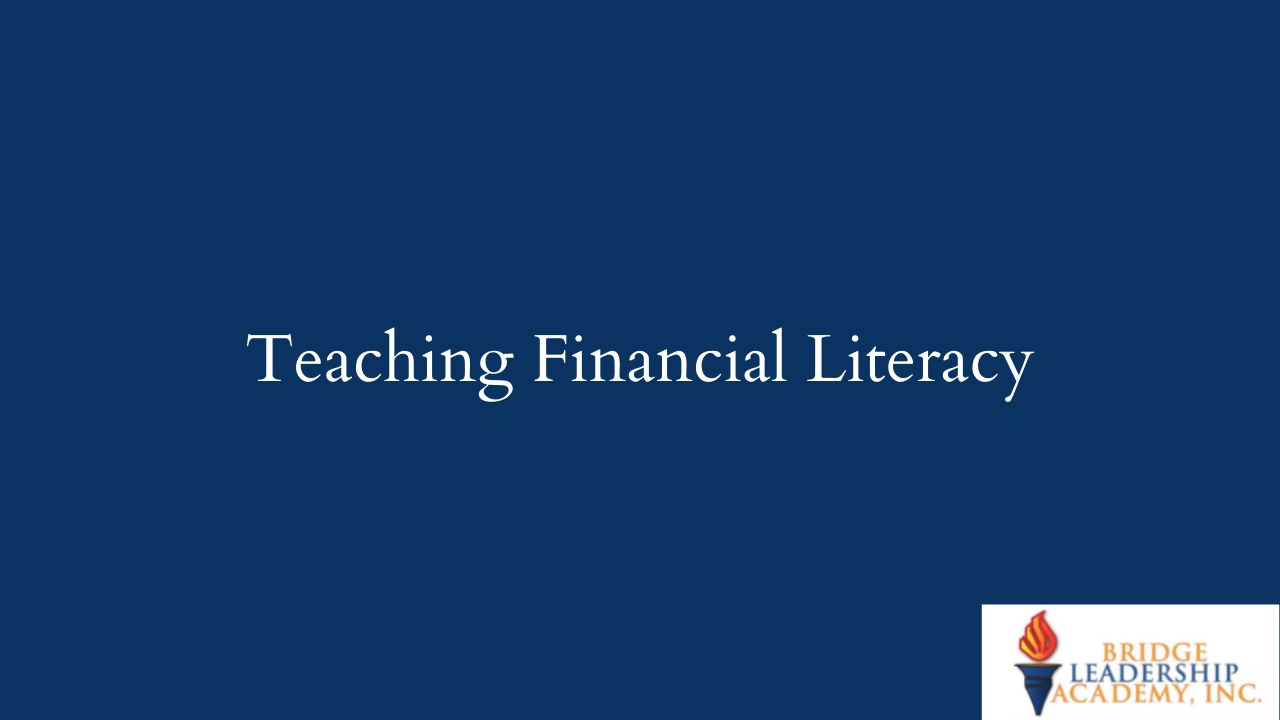Teaching Financial Literacy
Jan 13, 2022
Financial Literacy is the "ability to understand and effectively use various financial skills, including personal financial management, budgeting, and investing. Financial literacy is the foundation of your relationship with money, and it is a lifelong journey of learning."
Being educated on financial literacy is very important, and the Bridge believes in teaching our youth early so that they are prepared to manage their finances. Without financial literacy, the financial decisions we do or don't make could lack a strong foundation. Being educated early on puts our students at a great advantage.
When Someone Is Financially Literate...
They are able to:
- Create & stick to a budget and understand its importance
- Create short and long term financial plans
- Invest diversely and acquire valuable assets
- Earn more than they spend
Financially Literate Students Should Know...
- How to plan a budget, and spend according to it
- How to minimize college costs via scholarships and grants
- How to save and invest properly, such as Roth IRAs
- Understanding how credit/debit works
- Understanding how debit and credit cards work
5 Principles of Financial Literacy
- Earn
-
"Before you can start spending, saving, and investing, you need to know how much money you make. If you make the same amount each month, this part is pretty easy. Take a good look at your paycheck to identify your gross and net income, and note any other deductions, such as employer-sponsored health insurance or a retirement plan."
-
- Spend
-
"A personal budget is just a plan for how you want to spend your money, but it’s also the most useful tool for achieving your financial goals. To create a monthly personal budget, you’ll need to track your spending over the course of one month, and then break everything down into categories. These can be broad, as in the popular 50 30 20 budgeting rule, or specific, for those of us who want to get into the nitty gritty of our spending habits."
-
- Save
- "Setting aside some money in a designated emergency fund will give you peace of mind, and also prevent a financial setback from overtaking your life. "
-
Saving for a big purchase: "Whether you’re hoping to buy a car, a home, or pay for graduate school, the sooner you start saving, the less you’ll have to put aside each month."
- Borrow
- Once you enter adulthood, you might need to 'borrow' money in order to cover a large expense such as a car, college tuition, or a house. It is important to know how to borrow, take out loans, etc. in a smart and safe way.
- "APR (Annual Percentage Rate) is the key to comparing loans and credit cards. APR takes into account both the interest rate and fees to give you a more accurate idea of how much interest you’ll pay each year."
-
"In general, the higher your credit score, the less interest you’ll be charged. That means that if you’ve had financial difficulties in the past, you can get stuck in a vicious cycle where all of your money goes to paying off interest. That’s why building healthy credit is one of the most important steps to becoming financially literate. Keeping a balance on your credit card is one of the easiest ways to rack up debt, but choosing the right credit card and using it responsibly can actually help you improve your credit score."
- Protect
- Preventing fraud: "Once you’ve set yourself up with a solid budget and investment strategy, it’s important to protect the money that you’ve made. This means regularly reviewing your bank accounts and credit card statements for mistakes or suspicious activity; keeping documents and passwords secure to prevent scams and identity theft; and buying the right kind of insurance to protect yourself in the event of an emergency."
Sources
https://bungalow.com/articles/the-five-key-components-of-financial-literacy
https://unifyhighschool.org/financial-literacy-for-high-school-students/

